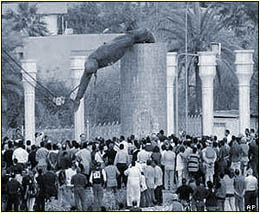Issue 8
Yaser Kerachian
Physics Student at the University of Toronto
In the last few weeks, my email-box was flooded with emails regarding the war on Iraq. I received many emails denouncing the abuse of Iraqi prisoners by US soldiers. The common message of all those emails was that US failed in its promises about Iraq. But is it really true?
In order to analyze the war, one should first set her perspective, whether it is based on the situation in Iraq and the countries in the region such as Iran, or the whole world. I would like to argue that at least in many aspects the war has been positive.

We can first look at the war as an Iranian whose main issue is the national interest of his home. People may be skeptical about the future of Iraq saying that everything has got worse since the invasion. However, in my opinion, the trouble that the coalition forces are now facing with is temporary. Iraq, because of its oil resources and strategic position, has a significant importance for US and therefore US will not leave Iraq unless some kind of stability returns to the country. So far, US has successfully removed Saddam, the lifetime enemy of Iran. Though Iraqi insurgents may explode a bomb once in a while, their infrastructure has been fully dismantled without any hope of a return to power. Sooner or later, a more or less democratic government will bring stability to the country which will also be of the interest of Iran and its people. Most political parties which are now in the Iraq governing council do not have a bad history with Iran and therefore it is likely that the two countries will build a strong friendship with each other. Becoming neighbor with a democratic country has also the advantage that it forces Iran to move in a similar direction. On the other hand, the return of Najaf to the attention of Shi'a clerics would weaken the religious fundamentalism in Iran. Not to mention how much economy of Iran has benefited from the increase in the price of crude oil which was mostly due to the war.
Those who are against the war usually bring up the arguments that US invasion can not be justified. They say that no weapon of mass destruction has been found and there is still no strong evidence of any link between Saddam and Al-Qaeda, rejecting the two primary reasons claimed by US government for the war. They also say that US cannot justify the war by claiming that they are bringing peace and democracy to Iraq since it is none of their business.

In my opinion, the flaw of the above argument lies on its emphasize on what caused the war. In reality, the factors that caused the war are far less important than its consequences. In the international perspective, every country acts based on its national interest and not in accordance to morality, though they may overlap many times. US indeed started the war on Iraq not in order to help Iraqis, but to get access to Iraq's oil resources or conquering a country in the Middle East. Similarly France, Germany and Russia did not join the coalition forces not because they were worried about the human loss of the war, but because of the financial issues. Russia and France needed Saddam to be in power in order for him to pay off his debt to them. Saying that the war is not justified is totally different from whether the war was good or bad.
We can also look at the war from an Iraqi's perspective. People usually argue that no country can bring democracy to the other by invading it since democracy has to be implemented by the people and take root in the country. Basically, it is claimed that democracy can not be imported. In my opinion, this statement is only partially true. There are some prerequisites for the people of a country to implement democracy. It is idealistic to say that all the time people can get to democracy themselves. In the case of Iraq, Saddam was a key obstacle to democracy and there was no hope that anything gets better under his ruling. If he would have died naturally, one of his sons would have taken over and nothing would have changed. US, by removing Saddam, provided the opportunity for the Iraqis to implement democracy themselves, the opportunity which would have never been achieved under the ruling of Saddam. Whether US really intended to do this or not is not that important.
The situation in Iraq may be a bit sketchy now and we should wait a bit longer in order to get a better idea of the future. Despite all the current chaos in Iraq, polls indicate that Iraqis are happier now compared to before the war. More importantly they are hopeful about the future. For this purpose, the situation in Afghanistan which is somehow similar to Iraq can also be studied. There are clear signs that the life conditions in Afghanistan have improved significantly. It is true that the central government may not have full control over the country but no one should wish the superficial security which was at the time of Taliban. Those who say that things are not going well in Afghanistan have not had the chance to see it before the war. Those who care about the war casualties never had a chance to see the mass graves of Shiites and Kurds killed by Saddam. It is sad to say that the choices are limited, dictatorship of Saddam or so called US imperialism. I am sure that the latter is the better. Those who seek the third way probably live in their dreams.












